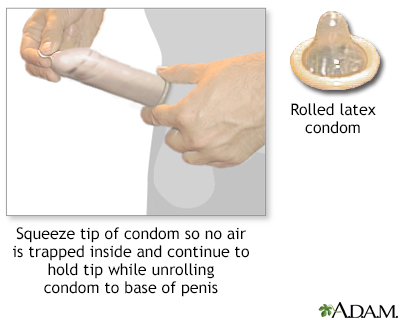Safe sex
Chlamydia - safe sex; STD - safe sex; STI - safe sex; Sexually transmitted - safe sex; GC - safe sex; Gonorrhea - safe sex; Herpes - safe sex; HIV - safe sex; Condoms - safe sex
Safe sex means taking steps before and during sex that can prevent you from getting an infection, or from giving an infection to your partner. These steps can make sex safer but not 100% safe.
Images




I Would Like to Learn About:
Information
A sexually transmitted infection (STI) is an infection that can be spread to another person through sexual contact. STIs include:
- Chlamydia
- Genital herpes
- Genital warts
- Gonorrhea
- Hepatitis
- HIV (human immunodeficiency virus)
- HPV (human papilloma virus)
- Syphilis
STIs are also called sexually transmitted diseases (STDs).
These infections are spread by direct contact with a sore on the genitals or mouth, body fluids, or sometimes the skin around the genital area.
Before having sex:
- Get to know your partner and discuss your sexual histories.
- Don't feel forced into having sex.
- Don't have sexual contact with anyone but your partner.
Your sexual partner should be someone who you know does not have any STI. Before having sex with a new partner, each of you should get screened for STIs and share the test results with each other.
If you know you have an STI such as HIV or herpes, let any sexual partner know this before you have sex. Allow him or her to decide what to do. If you both agree to have sexual contact, use latex or polyurethane condoms.
Use condoms for all vaginal, anal, and oral intercourse.
- The condom should be in place from the beginning to the end of the sexual activity. Use it every time you have sex.
- Keep in mind that STIs can be spread by contact with skin areas around the genitals. A condom reduces but does not eliminate your risk of getting an STI.
Other tips include:
- Use lubricants. They may help reduce the chance that a condom will break.
- Use only water-based lubricants. Oil-based or petroleum-type lubricants can cause latex to weaken and tear.
- Polyurethane condoms are less likely to break than latex condoms, but they cost more.
- Using condoms with nonoxynol-9 (a spermicide) may may irritate vaginal or penile tissue and thus increase the chance of HIV transmission.
- Stay sober. Alcohol and drugs impair your judgment. When you are not sober, you might not choose your partner as carefully. You may also forget to use condoms, or use them incorrectly.
Get tested regularly for STIs if you have new sexual partners. Many STIs have no symptoms, so you need to be tested often if there is any chance you have been exposed. You will have the best outcome and will be less likely to spread the infection if you are diagnosed early.
Consider getting the HPV vaccine to keep from getting the human papillomavirus. This virus can put you at risk for genital warts and for cervical cancer in women.
References
Del Rio C, Cohen MS. Prevention of human immunodeficiency virus infection. In: Goldman L, Schafer AI, eds. Goldman-Cecil Medicine. 26th ed. Philadelphia, PA: Elsevier; 2020:chap 363.
Landovitz RJ, Del Rio C, Cohen MS. Prevention of human immunodeficiency virus infection. In: Goldman L, Cooney KA, eds. Goldman- Cecil Medicine. 27th ed. Philadelphia, PA: Elsevier; 2024:chap 356.
Swygard H, Cohen MS. Approach to the patient with a sexually transmitted infection. In: Goldman L, Cooney KA, eds. Goldman- Cecil Medicine. 27th ed. Philadelphia, PA: Elsevier; 2024:chap 264.
US Preventive Services Task Force; Krist AH, Davidson KW, et al. Behavioral counseling interventions to prevent sexually transmitted infections: US Preventive Services Task Force Recommendation Statement. JAMA. 2020;324(7):674-681. PMID: 32809008 pubmed.ncbi.nlm.nih.gov/32809008/.
Workowski KA, Bachmann LH, Chan PA, et al. Sexually transmitted infections treatment guidelines, 2021. MMWR Recomm Rep. 2021;70(4):1-187. PMID: 34292926 pubmed.ncbi.nlm.nih.gov/34292926/.
BACK TO TOPReview Date: 4/18/2024
Reviewed By: Linda J. Vorvick, MD, Clinical Professor, Department of Family Medicine, UW Medicine, School of Medicine, University of Washington, Seattle, WA. Also reviewed by David C. Dugdale, MD, Medical Director, Brenda Conaway, Editorial Director, and the A.D.A.M. Editorial team.

Health Content Provider
06/01/2025
|
A.D.A.M., Inc. is accredited by URAC, for Health Content Provider (www.urac.org). URAC's accreditation program is an independent audit to verify that A.D.A.M. follows rigorous standards of quality and accountability. A.D.A.M. is among the first to achieve this important distinction for online health information and services. Learn more about A.D.A.M.'s editorial policy, editorial process and privacy policy. A.D.A.M. is also a founding member of Hi-Ethics. This site complied with the HONcode standard for trustworthy health information from 1995 to 2022, after which HON (Health On the Net, a not-for-profit organization that promoted transparent and reliable health information online) was discontinued. |
The information provided herein should not be used during any medical emergency or for the diagnosis or treatment of any medical condition. A licensed medical professional should be consulted for diagnosis and treatment of any and all medical conditions. Links to other sites are provided for information only -- they do not constitute endorsements of those other sites. © 1997- 2025 A.D.A.M., a business unit of Ebix, Inc. Any duplication or distribution of the information contained herein is strictly prohibited.
